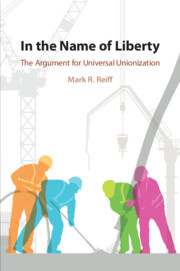2 - The Union as a Basic Institution of Society
from Second Essay
Published online by Cambridge University Press: 20 April 2020
Summary
While unionization is usually evaluated as an aspect of freedom of association—the idea being that workers have the right to associate and form unions if they want and have an equal right not to do so if they don’t, I argue that this is a mistake. Instead of merely allowing unions to form or not depending on the preferences of workers, I argue that unions are a basic and therefore necessary institution of a just society. After analyzing and criticizing the schema developed by John Rawls for evaluating what constitutes a basic institution, I introduce a new principle that allows us to determine what should be considered a basic institution in the context of our existing social institutions and practices. I then apply this principle to unionization, and argue that while unions are subject to post-institutional regulation, just like firms are, their existence is demanded by pre-institutional principles of equality and liberty and therefore not optional. Not only are union shops consistent with our deepest moral principles, including our commitment to liberty, that commitment, when properly understood, actually requires that unionization be universal.
Keywords
- Type
- Chapter
- Information
- In the Name of LibertyThe Argument for Universal Unionization, pp. 63 - 166Publisher: Cambridge University PressPrint publication year: 2020

